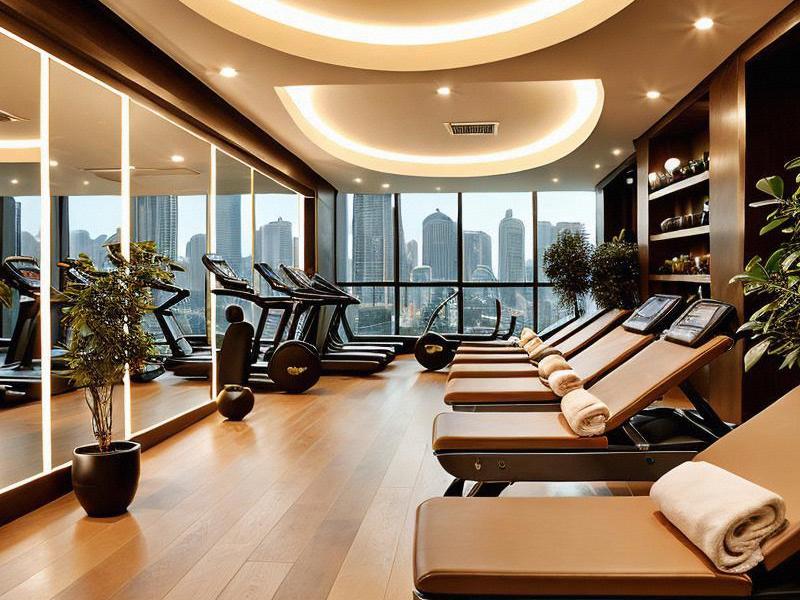
In recent years, Shanghai has witnessed a surge in the popularity of wellness clubs, reflecting a broader trend in China towards prioritizing health and wellness. These clubs offer a wide range of services, from traditional fitness activities to holistic therapies, creating a space where individuals can escape the stress of daily life and focus on their overall well-being.
One of the key factors driving the growth of wellness clubs in Shanghai is the increasing awareness among residents about the importance of mental and physical health. With the city's fast-paced lifestyle, many people are seeking ways to unwind and recharge. Wellness clubs provide an environment that caters to these needs, offering a blend of fitness, relaxation, and rejuvenation.
The concept of comfort in wellness clubs extends beyond just physical amenities. It encompasses a holistic approach to well-being, including mental, emotional, and spiritual aspects. These clubs often feature state-of-the-art facilities, serene environments, and personalized services designed to cater to the unique needs of each individual.
One notable example of a wellness club in Shanghai is the "Wellness Oasis," located in the heart of the city. This club offers a variety of services, including yoga, meditation, spa treatments, and nutritional counseling. The serene ambiance, combined with expert guidance, makes it a popular destination for those seeking a break from the hustle and bustle of urban life.
上海龙凤419官网 Another emerging trend in Shanghai's wellness scene is the integration of technology with traditional wellness practices. Many clubs now offer virtual reality (VR) meditation sessions, allowing members to immerse themselves in calming environments while receiving guided meditation. This innovative approach not only enhances the experience but also makes wellness more accessible to a wider audience.
The rise of wellness clubs in Shanghai is also closely linked to the city's growing middle class and their increasing disposable income. As people become more affluent, they are willing to invest in experiences that promote health and happiness. Wellness clubs provide a premium service that caters to this demographic, offering a luxurious escape from the pressures of modern life.
Moreover, the COVID-19 pandemic has further accelerated the demand for wellness services. The global health crisis has made people more conscious of their health and the importance of maintaining a strong immune system. Wellness clubs have adapted to this changing landscape by introducing new services such as immunity-boosting programs, online fitness classes, and mental health support.
In addition to physical health, wellness clubs in Shanghai also focus on mental well-being. With the increasing prevalence of stress, anxiety, and depression, these clubs offer counseling services, stress management workshops, and mindfulness programs. By addressing the mental health aspect, wellness clubs are helping individuals achieve a more balanced and fulfilling life.
上海私人品茶 The success of wellness clubs in Shanghai can also be attributed to their ability to cater to diverse cultural preferences. The city is home to a large expatriate community, and many wellness clubs have embraced this diversity by offering services that cater to different cultural backgrounds. For instance, some clubs provide yoga classes in various languages, while others offer traditional Chinese medicine treatments alongside modern wellness practices.
The impact of wellness clubs extends beyond the individuals who frequent them. These establishments contribute to the local economy by creating jobs and attracting tourists. They also play a role in promoting a healthy lifestyle, which has long-term benefits for the community as a whole.
However, the rapid growth of wellness clubs in Shanghai has also brought about challenges. The market is becoming increasingly competitive, with new clubs opening regularly. This has led to a focus on differentiation, with clubs striving to offer unique services and experiences to stand out.
上海夜生活论坛 Sustainability is another important consideration for wellness clubs in Shanghai. As environmental awareness grows, these establishments are adopting eco-friendly practices to reduce their carbon footprint. From using renewable energy sources to sourcing sustainable products, wellness clubs are leading the way in promoting sustainability.
The future of wellness clubs in Shanghai looks promising, with continued growth expected in the coming years. As people become more health-conscious and seek ways to improve their quality of life, the demand for wellness services will likely increase. Clubs that can adapt to changing trends and offer innovative solutions will be well-positioned to thrive in this competitive market.
In conclusion, the rise of wellness clubs in Shanghai represents a significant shift in the city's approach to health and well-being. These establishments offer a sanctuary for relaxation, mental rejuvenation, and holistic health, catering to the diverse needs of the population. As Shanghai continues to evolve, wellness clubs will play an increasingly important role in promoting a healthy and balanced lifestyle.
